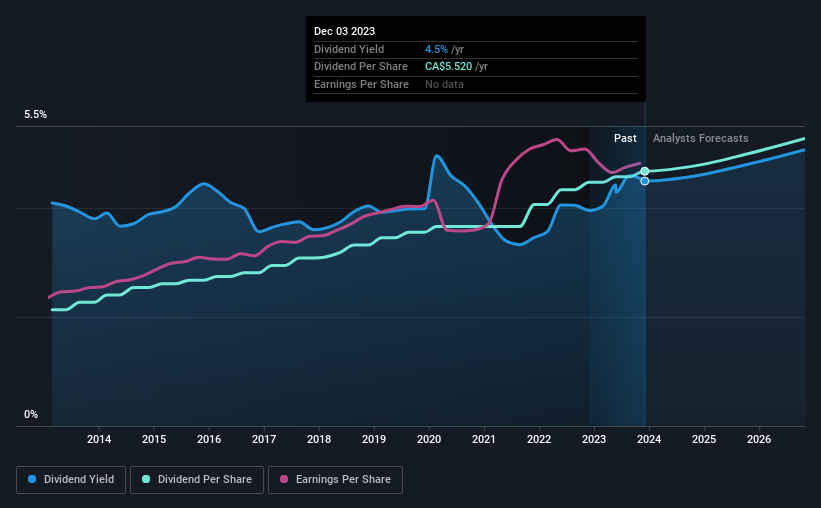Royal Bank of Canada (TSE:RY) Has Announced That It Will Be Increasing Its Dividend To CA$1.38
Royal Bank of Canada's (TSE:RY) dividend will be increasing from last year's payment of the same period to CA$1.38 on 23rd of February. The payment will take the dividend yield to 4.5%, which is in line with the average for the industry.
View our latest analysis for Royal Bank of Canada
Royal Bank of Canada's Dividend Forecasted To Be Well Covered By Earnings
We aren't too impressed by dividend yields unless they can be sustained over time.
Royal Bank of Canada has established itself as a dividend paying company with over 10 years history of distributing earnings to shareholders. Past distributions do not necessarily guarantee future ones, but Royal Bank of Canada's payout ratio of 51% is a good sign as this means that earnings decently cover dividends.
Looking forward, EPS is forecast to rise by 2.3% over the next 3 years. Analysts forecast the future payout ratio could be 52% over the same time horizon, which is a number we think the company can maintain.
Royal Bank of Canada Has A Solid Track Record
The company has a sustained record of paying dividends with very little fluctuation. Since 2013, the dividend has gone from CA$2.52 total annually to CA$5.52. This means that it has been growing its distributions at 8.2% per annum over that time. The growth of the dividend has been pretty reliable, so we think this can offer investors some nice additional income in their portfolio.
Royal Bank of Canada May Find It Hard To Grow The Dividend
Some investors will be chomping at the bit to buy some of the company's stock based on its dividend history. However, Royal Bank of Canada has only grown its earnings per share at 4.4% per annum over the past five years. Growth of 4.4% per annum is not particularly high, which might explain why the company is paying out a higher proportion of earnings. This isn't bad in itself, but unless earnings growth pick up we wouldn't expect dividends to grow either.
We Really Like Royal Bank of Canada's Dividend
Overall, we think this could be an attractive income stock, and it is only getting better by paying a higher dividend this year. Distributions are quite easily covered by earnings, which are also being converted to cash flows. All of these factors considered, we think this has solid potential as a dividend stock.
Investors generally tend to favour companies with a consistent, stable dividend policy as opposed to those operating an irregular one. At the same time, there are other factors our readers should be conscious of before pouring capital into a stock. Earnings growth generally bodes well for the future value of company dividend payments. See if the 9 Royal Bank of Canada analysts we track are forecasting continued growth with our free report on analyst estimates for the company. Looking for more high-yielding dividend ideas? Try our collection of strong dividend payers.
Have feedback on this article? Concerned about the content? Get in touch with us directly. Alternatively, email editorial-team (at) simplywallst.com.
This article by Simply Wall St is general in nature. We provide commentary based on historical data and analyst forecasts only using an unbiased methodology and our articles are not intended to be financial advice. It does not constitute a recommendation to buy or sell any stock, and does not take account of your objectives, or your financial situation. We aim to bring you long-term focused analysis driven by fundamental data. Note that our analysis may not factor in the latest price-sensitive company announcements or qualitative material. Simply Wall St has no position in any stocks mentioned.
